It is difficult to imagine a more turbulent and bizarre life than that of Andronicus Comnenus, Byzantine emperor and last of his dynasty. Charismatic, contradictory, lover of worldly pleasures, military expert, his strong character and lack of scruples led him to experience extreme situations, among which twelve years of captivity, numerous war campaigns, scandalous love affairs, various conspiracies, exile and a violent seizure of power. His own death, horrifying, was consistent with that convulsive existence.
Andronicus was born in Constantinople around 1118 and was of imperial stock:his father, Isaac Comnenus, was sebastocrator , honorary title to designate someone very close to the throne, which was occupied by his brother, John II. That does not mean that it was a well-matched family, since Isaac did not accept willingly the decision of his father, Alejo I, that Juan succeed him and that is why he was accused of treason, having to flee, although in the end he received a sorry. Instead, Andronicus' older brother, also named John, decided to join the Ottomans and even converted to Islam.
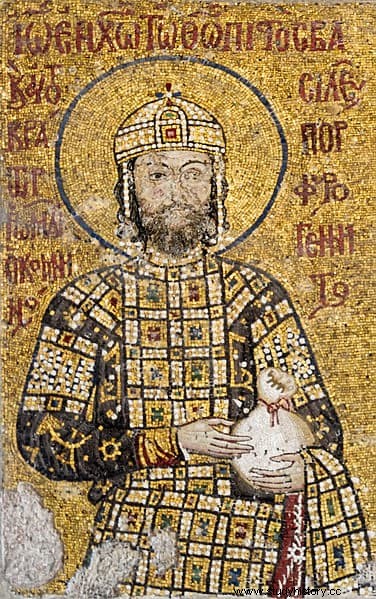
Andronicus would have occasion to deal with him in this new life because in the year 1141 he fell into a Turkish ambush during a hunt and spent a year in prison in Iconium. His cousin Manuel, the youngest of the scions of the basileus (the emperor, in Byzantine terminology), with whom he had grown up, paid his ransom. Shortly after, three of his brothers died of illness, leaving two:Isaac and himself, although, surprisingly, the emperor named the second heir and when he also died in 1143, Manuel ascended the throne. Everything was looking good for Andrónico but his strong personality was going to twist things.
It happened when Manuel granted his nephew Juan Komnenos the positions of protovestiarios (in charge of the emperor's wardrobe) and protosebasto (dignity for the close relatives of the emperor) to compensate him for having lost one eye in a tournament. Andrónico felt offended because his relationship with Juan was worse than bad and since then the affective bond that he had with Manuel, of whom he considered himself a favorite, was broken. Perhaps to take revenge on both of them, he seduced Eudoxia, the sister of his enemy, drawing a parallel with the relationship that his other sister, Teodora, had with the basileus himself. .
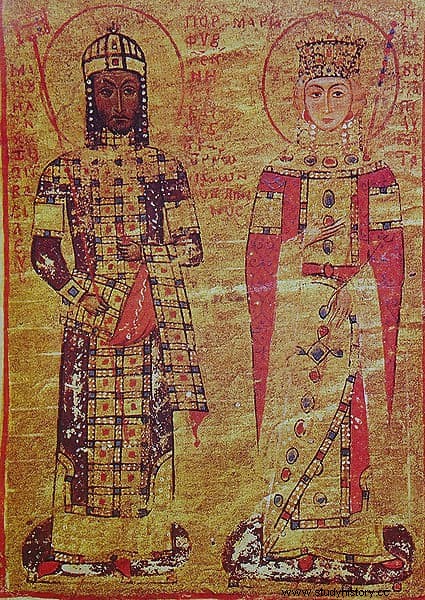
The scandal led Manuel to appoint him governor of Cilicia in 1152, where several Armenian lords had rebelled. Andronicus laid siege to Mopsuestia's fortress but the nocturnal revels caused him to raise his guard and the enemy made a surprise sally, defeating him and sacking the camp. He managed to escape to Antioch, although Manuel not only did not scold him too much but also gave him a dukedom and put him at the head of the army that was to pacify Hungary. There he survived an attack organized by the brothers of Eudoxia that made him suspect that perhaps the emperor himself was involved.
It is likely that it was then that he began plotting a coup, enlisting the help of the Hungarian monarch Géza II and the head of the Holy Roman Empire, Frederick I Barbarossa . The plan included the murder of Manuel at the hands of Andronicus himself, but he was discovered; although his life was spared, he found his bones in prison for twelve years, time spent brooding over deep resentment. In 1165, after several intrepid escape attempts (sliding down a latrine, getting the guards drunk, swinging down the walls with a rope...) and failed, which also led to the sentence for Eudoxia (they locked her up with him and there they conceived a son ), managed to escape.
Some Vlachs recognized and captured him in the Carpathians but he outwitted them one night by leaving a doll covered with blankets and arrived in kyiv, where he placed himself under the protection of Prince Yaroslav Osmomysl of Ruthenia, with whom he made good friends. A quiet decade passed by his side until an unexpected and surprising message arrived:Manuel offered him a pardon in exchange for him obtaining the support of Ruthenia against the Hungarians, with whom there was war again. Andronicus accepted and personally led a cavalry corps, participating in several battles and returning to Constantinople to the praise of the multitude three years later.
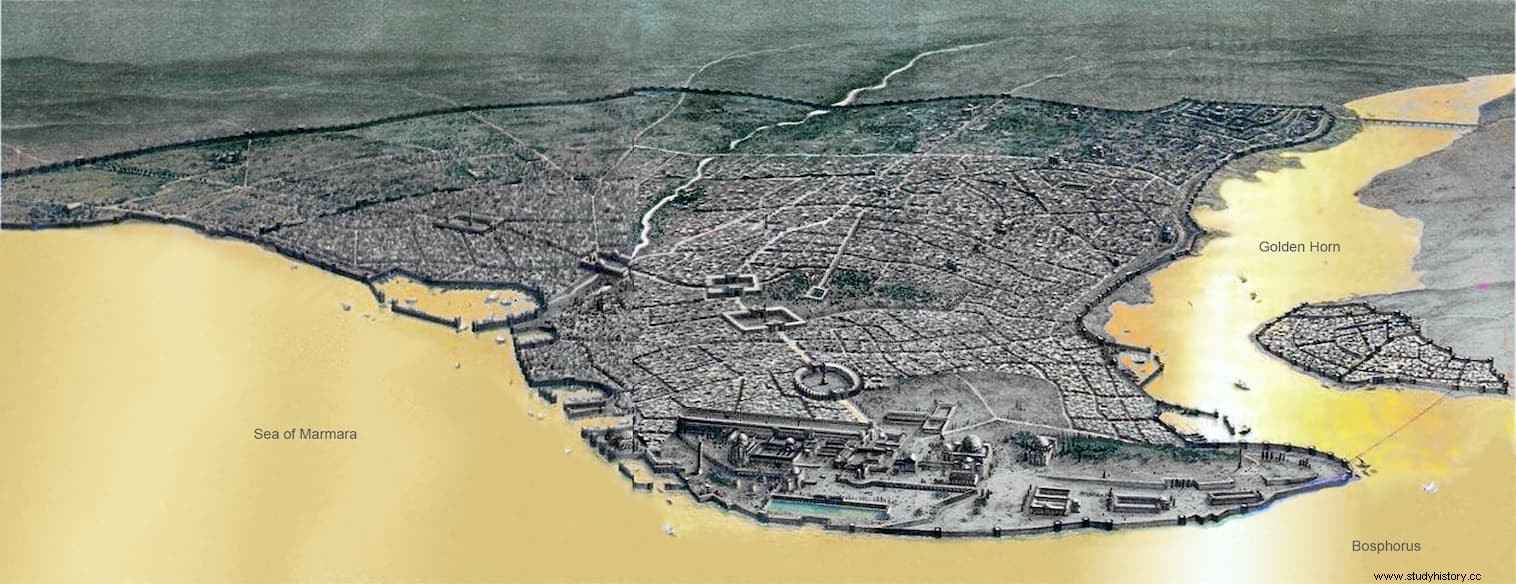
But the clouds reappeared. Manuel only had daughters and wanted a male successor to the throne, so he adopted Prince Béla, son of Géza II, as such, to whom he also granted the hand of his daughter Maria Comnena. Andronicus led the almost unanimous protests of the Byzantine nobility, refusing to swear allegiance to him. That supposed him the distance of the court, being assigned again to Cilicia, where the Armenians were again raised in arms. He repeatedly defeated them but without being able to silence the rebellion definitively and, bored, he went to Antioch, establishing a public affective relationship with Princess Filipa, the emperor's sister-in-law.
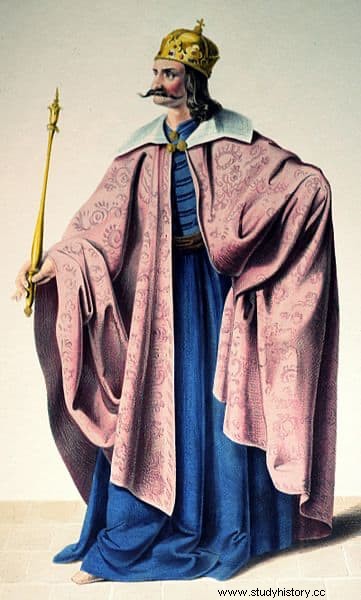
The latter, obviously, did not like it at all, especially when Andronicus abandoned her without further ado; deliberately, because what he really wanted was to annoy his mother, Manuel's wife, whom he couldn't stand. To avoid his wrath, he made a pilgrimage to the Holy Land, taking the sackcloth treasure with him and winning the favor of King Amalric I of Jerusalem, who granted him the lordship of Beirut. There, and despite the fact that he was already fifty-six years old, he returned to his old ways seducing Theodora, the young widow of King Baldwin III and niece of the emperor. Manuel finally snapped and demanded that he be handed over to him, but the two lovers fled first to Damascus and then to the Caucasus to take refuge in the court of George III of Georgia, whose sister had been Andronicus's first wife.
From there he led several raids against Byzantine interests in Trebizond until the provincial army managed to apprehend Theodora and her children, sending them to Constantinople. Fearing for their lives, Andronicus begged for mercy, agreeing to make a public, chain-laden submission. Manuel granted it to him but preferred to distance him from the court by naming him Duke of Paflagonia, a city located on the Black Sea coast, between Bithynia and Pontus, where he did not cause any more problems, but his resentment increased.
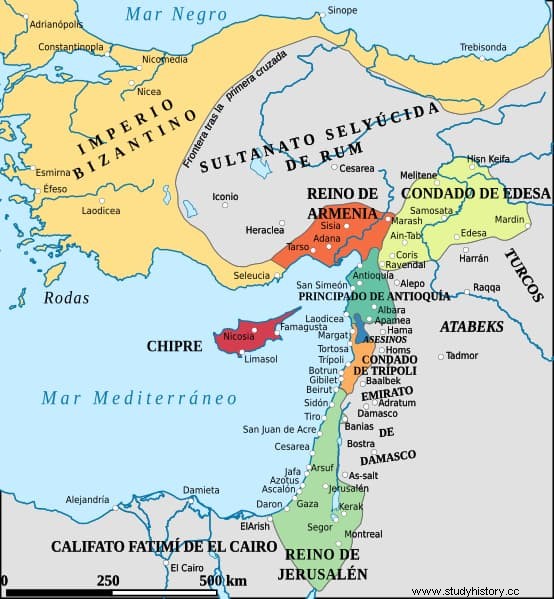
Manuel died in 1180 and his son Alejo II succeeded him, because he had finally been able to father a son, although he was still an eleven-year-old boy and that is why a regency council was formed headed by his mother, María. She this one not only left the convent to which she had retired but she cast herself as a lover to the protosebasto s Alejo, nephew of the late emperor, who would govern in practice. The scandal was multiple because of the love relationship -considered incestuous-, because that man was considered an upstart, because of the nepotism that he practiced and because he directed state affairs autocratically.
To make matters worse, it practiced a pro-Western policy -latinizing, it was said then- that was not liked at all by the Byzantine aristocracy because it exempted its merchants from taxes, who controlled the economy to the detriment of the local bourgeoisie, which caused it to spread among the population an irrational hatred of everything of Italian origin that would have serious consequences in a short time. A conspiracy soon arose and Andronicus, seeing the great opportunity, joined it. It was run by Princess Maria, a daughter from Manuel's first marriage who was married to Rainier of Monferrato, who held the position of Caesar (at that time a lower rank than before). Patriarch Theodosius Boradiotes supported them.
Everything was unleashed in 1182, when those involved incited a popular revolt against the regency council and an uprising in the provinces. However, the plot was discovered and they had to barricade themselves in Hagia Sophia. Alejo's attempt to storm the temple, a desecration, exasperated the people and an amnesty had to be granted; in return, the patriarch was deposed, which did little to allay the unrest. Nor did the Hungarians seize the opportunity to recover their lost territories, the Turks seize disputed border regions from the empire, or the Serbs and Armenians rebelled.
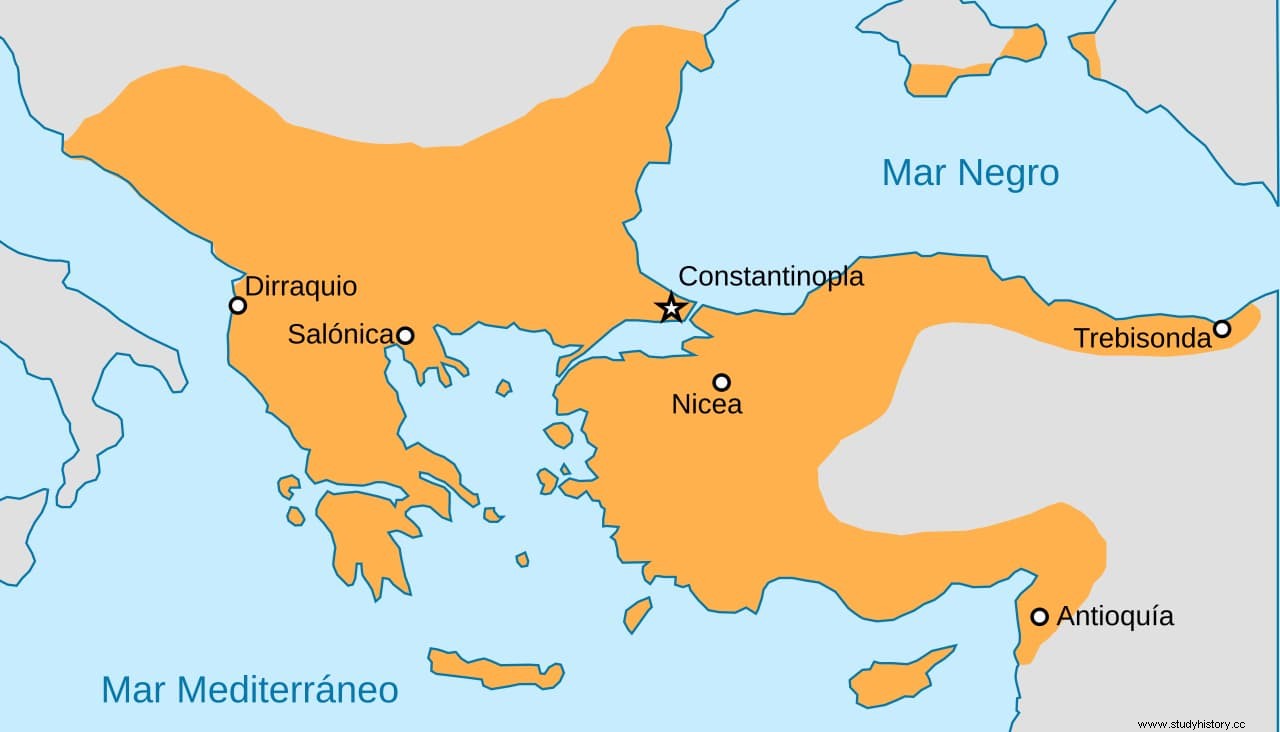
Thus things stood while Andronicus marched towards Constantinople at the head of an army that was swelled by the malcontents; he did it deliberately slowly so that the situation would deteriorate as much as possible and appear as a providential savior. In fact, the only one who tried to stop him, a cousin of Manuel named Andrónico Ángelo, was defeated and went over to his side. Soon after, the Byzantine fleet joined him and Alexios was left alone; so much so that the Varega Guard betrayed him, deposing him.
In the absence of authority, events rushed towards tragedy. The popular masses gave free rein to their phobia and unleashed a bloody persecution against Italian merchants (especially Genoese and Pisan), priests and, in general, Catholics, without respecting their families either in age or sex. It is what is known as the Massacre of the Latinos , in which about sixty thousand people lost their lives or were forced to flee, leaving only about four thousand who were sold as slaves to the Sultanate of Rum. Although Andronicus shared this hatred, he did not take part in the events because he had not yet reached Constantinople. When he finally entered the city acclaimed, his presence was enough to calm things down.
He crushed the last embers of resistance and, taking on the duties of tutor, crowned Alexios II. One after another, all those who could shade him fell. Maria and Rainier died poisoned, according to the rumors by his order; the queen regent was again confined in a convent and ended up executed by strangulation, accused of conspiring; It was the same charge applied to Andrónico Ángelo and the admiral of the fleet, who had to flee; other presumed enemies suffered worse luck and ended up blinded, mutilated and/or executed. The future of the basileus teenager did not seem very hopeful.
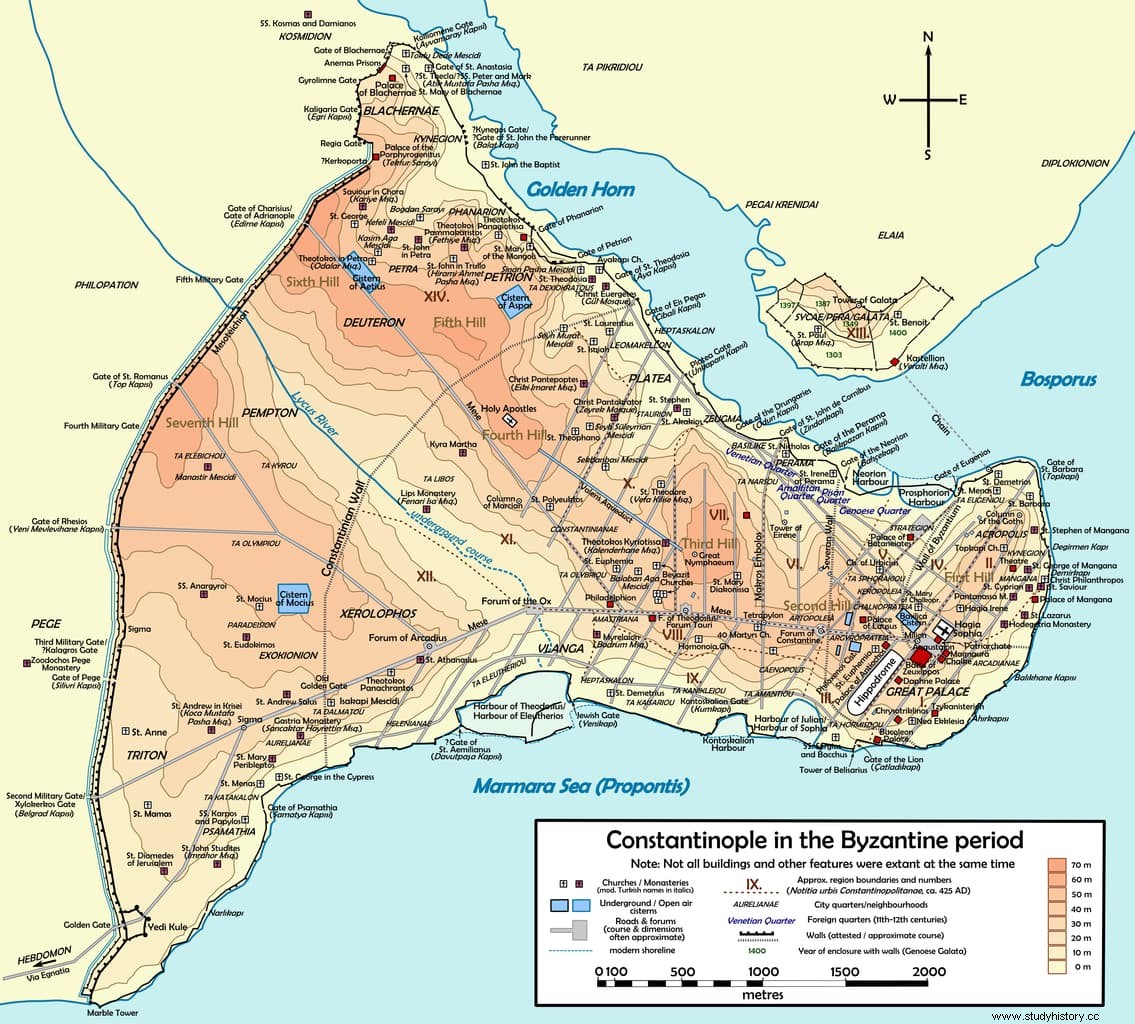
And he wasn't. Supposedly responding to a demand from the court and the clergy, Andronicus fulfilled his old ambition by crowning himself co-emperor, he said, to face difficult circumstances and protect Alexios II. But this one, of course, was the next to fall:two months later he was assassinated and his uncle, at last, openly became emperor. He even married Agnes of France, the widow, who was even younger than her late husband, thirteen years old; yes, Andronicus, who was sixty-five, kept Theodora by his side. For that he had appointed a new related patriarch who, in addition, officially forgave him everything he had previously done illegally or immorally.
The brand new basileus he had a reign as short as it was bloody:from September 1183 to September 1185. A two-year period during which he obtained considerable achievements:he signed peace with the Seljuks of Saladin in order to focus his attention on recovering what was lost to Hungary, something that got; he put an end to Italian piracy, which had been launched by Genoa and Pisa after the Massacre of the Latins , agreeing on the payment of compensation and the release of the remaining Venetian captives; he put down with blood and fire an insurrection in Bithynia; and restored relations with the Pope.
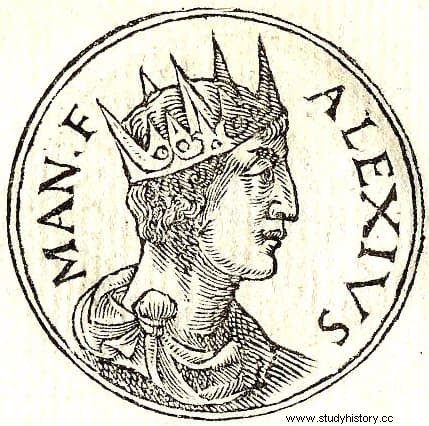
Likewise, he emphatically put an end to the generalized corruption, establishing meritocracy in the administration and improving the salaries of civil servants, which meant a notable improvement in treasury income. On the other hand, he tried to win over the people by limiting feudalism and curtailing the privileges of the aristocracy, spreading a populist iconography of himself as a simple peasant. Moreover, he promoted measures to alleviate the existence of the humble classes, which, combined with the above, earned him the opposition of the same nobles that he had once defended.
That is why his external successes were overshadowed by internal problems and, above all, his inability to govern without violence. It did not take long for an opposition to his figure to sprout, which he decided to nip in the bud, plunging the empire into a wave of summary deaths. Every discovered or suspected conspiracy was met with executions, also carried out with chilling brutality, and Andronicus's already difficult character became more and more outrageous, seeing enemies everywhere and acting accordingly. The mass executions of nobles sowed fear but gave way to indignation and soon the goal was to get him out of the way. The bad thing for him was that the people also turned their back on him when they saw his concessions to Venice and the Pope.
Cyprus, an important source of income, became independent without being able to avoid it because there was no fleet for it, since the death of the nobles had cut off the base of the army. Alejo Komnenos, Manuel I's nephew, convinced the Normans to organize an invasion from Sicily, an island they then controlled:Epidamno, Corfu, Cephalonia, Zante, Thessaloniki... one after another, they conquered places, sometimes without the defenders putting too much effort. endeavor. At this point, Andronicus seemed to have thrown in the towel and was only devoting his attention to the parties he organized in his Propontis refuge between the feverish signing of death sentences.
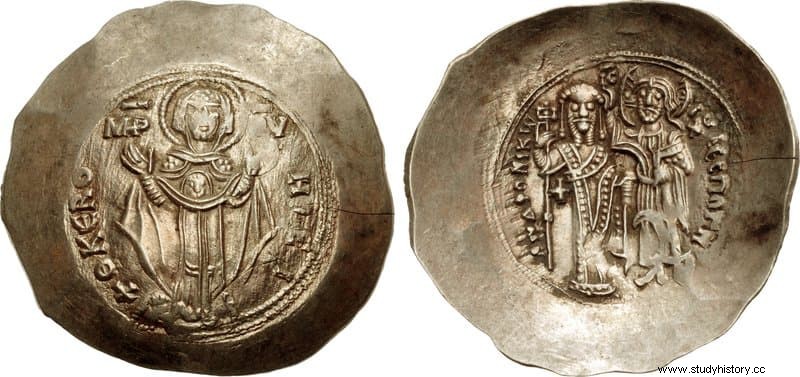
This apparent indifference could be due, perhaps, to the fact that an oracle prophesied that the danger lay in someone whose name began with "Is" and he believed he could solve it by exterminating all that possible enemy named Isaac. One of them was Isaac Ángelo, a minor nobleman who was able to escape the assassins and took refuge in Santa Sofía, converted into a concentration point for all the discontented. Thus a riot broke out in which the masses crowned the fugitive, freed the prisoners and stormed the palace, looting it. Andronicus, who had just arrived, offered to abdicate in his son Manuel, but faced with his rejection, he chose to embark for the Crimea with his family. He wouldn't get far.
The weather was bad and they caught up with him, taking him back to Constantinople, where the aristocrats beat him up. It was only the beginning of the agony that awaited him:paraded through the streets on the back of a dull horse, he received all kinds of humiliations, blows and attacks until he reached the Hippodrome, where they amputated his hands and pulled out his hair, teeth and a eye, to be then hung by the feet and pummeled by anyone who wanted. A soldier put an end to the suffering by killing him with the sword, although it was forbidden to bury his body. His children, Manuel and Juan, also had a bad ending, the first blinded by the mob and the second killed by his troops when they found out about his father; the rest of the family was able to escape.
It was the end of the Comnena dynasty and the beginning of that of the Angels, embodied in the aforementioned Isaac II and that would not last twenty years.
